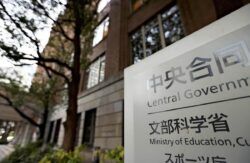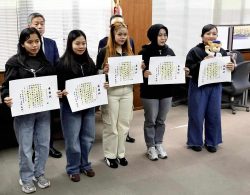16:00 JST, April 13, 2022
Less than 15% of schoolchildren in the Philippines, or about 3 in every 20, can read simple texts in large part due to the longest school closure of more than 70 weeks as of the middle of February caused by the COVID-19 pandemic, the United Nations Children’s Fund (UNICEF) said in a report.
The latest UNICEF assessment translates to a learning poverty — defined by the World Bank as the share of 10-year-olds who cannot read or understand a simple story — of more than 85%, which is slightly better than the World Bank estimate of as high as 90% in November of last year.
Learning poverty in 2019, or before the pandemic happened, was 69.5%, according to the World Bank.
UNICEF’s latest joint report with the U.N. Educational, Scientific and Cultural Organization (UNESCO) and the World Bank titled “Where are We on Education Recovery?” showed that schools in the Philippines had been closed from in-person classes the longest among the 122 countries that the report covered.
Since the onset of the pandemic in 2020, only a few schools in the country have returned to in-person instruction and the government had piloted in-person schooling in public schools, but in a limited scope as COVID-19 continued to rear its ugly head.
Next to the Philippines with the longest schools closure was Uganda, which was nearing breaching the 70-week mark.
Although with shorter closures than the Philippines, however, many other poor and developing countries such as Afghanistan, Cambodia, Chad, Democratic Republic of the Congo, Ethiopia, Gambia, Mozambique, and Myanmar suffered a similar fate of having only less than 15% of children able to read a simple text.
“Data from the UNESCO global monitoring of school closures reveal that about 1 in 10 countries have fully closed their schools for over 40 weeks. Schoolchildren around the world have missed an estimated 2 trillion hours — and counting — of in-person learning since the onset of the pandemic and subsequent lockdowns,” UNICEF added.
UNICEF noted that even before the pandemic more than half of 10-year-olds in low- and middle-income countries were unable to read or comprehend a simple story — “now that figure is estimated to be as high as 70%.”
“This has been exacerbated by two years of COVID-19-related school closures, which have deepened education inequality. In fact, nearly 153 million children missed more than half of their in-person schooling over the past two years, with more than 62 million of them having missed at least three-quarters of in-person schooling,” UNICEF said.
“The chain effect of school closures could be staggering and felt far beyond education. In addition to missed learning, school closures deprive children of the benefits to their safety, health, nutrition, and overall well-being provided by schools. The impacts of school closures are wide-ranging: estimates suggest 10 million more children could fall off-track in early childhood development as a result of early childhood care and education closures in the first 11 months of the pandemic,” UNICEF said.
President Rodrigo Duterte’s economic team said resuming all classes in-person would add much more to the windfall to be reaped from Executive Order No. 166, which put in place the Philippines’ “new normal” policies to make COVID-19 endemic or a part of everyday life.
Socioeconomic Planning Secretary Karl Kendrick Chua said that “the full benefit of Alert Level 1 cannot be maximized if the majority of schools are still closed for face-to-face learning.”
“We urgently call for the full resumption of face-to-face learning in areas under Alert Level 1. We already have most elements in place to enable our full recovery in 2022. The biggest piece missing is our education sector. More than the foregone economic activity, we are concerned for the learning and future productivity of our children. Under Alert Level 1, children are allowed to engage in leisure and recreational activities for all indoor and outdoor venues, but the most important activity of children — going to school and learning fully — continues to be restricted,” according to Chua.
Top Articles in World
-

China Confirmed to Be Operating Drilling Vessel Near Japan-China Median Line
-

China Eyes Rare Earth Foothold in Malaysia to Maintain Dominance, Counter Japan, U.S.
-

Japan, Qatar Ministers Agree on Need for Stable Energy Supplies; Motegi, Qatari Prime Minister Al-Thani Affirm Commitment to Cooperation
-

North Korea Possibly Launches Ballistic Missile
-

10 Universities in Japan, South Korea, Mongolia to Establish Academic Community to Promote ICC Activities, Rule of Law
JN ACCESS RANKING
-

Univ. in Japan, Tokyo-Based Startup to Develop Satellite for Disaster Prevention Measures, Bears
-

JAL, ANA Cancel Flights During 3-day Holiday Weekend due to Blizzard
-

China Confirmed to Be Operating Drilling Vessel Near Japan-China Median Line
-

China Eyes Rare Earth Foothold in Malaysia to Maintain Dominance, Counter Japan, U.S.
-

Japan, Qatar Ministers Agree on Need for Stable Energy Supplies; Motegi, Qatari Prime Minister Al-Thani Affirm Commitment to Cooperation




















